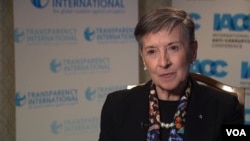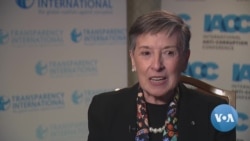Last week, Transparency International held its annual International Anti-Corruption Conference in Washington, where representatives from 140 countries gathered to take stock of the global fight against corruption and explore ways of combating corrupt practices and individuals.
The nonprofit watchdog group said Russia's invasion of Ukraine renewed efforts by democratic nations to do more to deny safe haven to so-called "kleptocratic assets." At the same time, the group said the failure of wealthy countries in the G-20 to pass an anti-corruption agency shows there is still much more to crack down on transnational corruption.
Delia Ferreira Rubio, chair of the corruption watchdog Transparency International, told VOA in an interview that global anti-corruption efforts are on the right path, and supporters are expanding awareness and building tools and networks to curb corruption.
The interview is edited for clarity and brevity.
Delia Ferreira Rubio: I think that we have gathered 2,000 from around the world, not only Transparency International fighters against corruption, but many other organizations and individuals and it is clear that this is a collective action effort. The only way to defeat corruption is working together, including public sector, private sector, civil society and citizens.
VOA: So, what did you hear from representatives and from governments? Did you hear reassurances, strong reassurances, that the fight against corruption will be taken on and that there will be action to combat corruption?
Rubio: Yes, we have heard that kind of declarations here before and what we would like to see is action. (Political) Candidates, for instance, talk about 'I will fight against corruption,' and then they forget that promise and start doing other things. So, we need action now. We, the civil society, are fed up with commitments and declarations. We need action. We need them to protect those defending integrity, we need them to react when some cracks are there using power (and) influence in order to escape sanctions or things like that. I always say that we have to fight for more information, more integrity, less impunity, less indifference. And this impunity factor means that governments and the judiciary should be applying laws and prosecuting and sanctioning those involved in corruption no matter how powerful they are.
VOA: You talk about sanctions. For some people corruption is like terrorism, right. So, there are people who governments will consider terrorists, but for other people, they will be freedom fighters. For some people, some countries are more corrupt than others, and there are sanctions applied against certain countries and there are arguments that corruption is a domestic issue that governments, through their civil society mechanisms, should fight corruption rather than international sanctions. What is your response to that?
Rubio: Corruption is a global problem. Those countries, which according to our perception index, are seen as transparent, have a responsibility to stop the global phenomenon of corruption, because this is a network. This is a network of corrupt actors that act for their own profit, of course, and exploit all loopholes in legislation. And we have to have those countries perceived as transparent, really involved in playing the role they have in terms of being gatekeepers stopping this.
VOA: You heard Jake Sullivan, the U.S. National Security Adviser, at the beginning of this conference, saying that over $30 billion worth of assets from Russian oligarchs have been frozen in the Western world. Is this the kind of action that you want to see?
Rubio: Yeah, of course, but not only frozen, they have to be confiscated and the assets that has been stolen should go back to the country's poor they have been stolen from and with guarantees. This is a problem with asset recovery — who will be in charge of using these funds? These assets will come back to countries, but the freezing of assets is a very important thing.
VOA: So, now that you bring this fight against corruption into international fora, where you have different international actors combating corruption wherever it happens, do you have the necessary international institutional tools and legitimacy whereby you can effectively fight corruption?
Rubio: There are many things that have to be done and processes be put in place and probably laws that need to be passed in order to guarantee the rest of the process in terms of we have frozen these assets and now we can proceed. For the time being, we have lots of conventions signed by almost all countries around the world like the UNCAC (United Nations Convention Against Corruption) convention. We have regional conventions against corruption. We have conventions against foreign bribery for instance, and we have anti-corruption agencies. We have an independent judiciary in many countries. And that has been key in this process because the national courts decide using the legal, local law, domestic law, and under the umbrella of these international conventions. That's not the end. And of course, this is work in progress, as all legal institutions are. Law is creating the tools that we can use to better the situation. And I think there are lots of things to do, including discussions on an international anti-corruption court. We at Transparency International are researching that possibility but we also foster the possibility of using the regional institutions in order to guarantee the enforcement of conventions, etc.
VOA: You obviously are searching for global consensus regarding fighting corruption more effectively. In this conference, there were no representatives from the governments or civil society from countries like Russia, China, Iran.
Rubio: Well, we have civil society from Russia. We have just had the lady in charge of the investigations in Navalny Foundation, and she is here working with us.
VOA: What about Iran, China, Afghanistan, those other countries that we often hear about corruption being massive there. Did you have anybody from those countries?
Rubio: I am not sure they have been here at this conference. We have had a chapter that is now disintegrated in China. We worked with them for some years, of course, we need to have independent NGOs and when we see some resource capture of the organization by corrupt government or an authoritarian regime, of course, that's not what we work with. But the conferences are open to anyone who wants to register and come up here and talk with us. What we are for is very clear: democratic values, transparency, and integrity. We are against authoritarian regimes because [it's] simple as they don't allow freedom of expression, freedom of association, the free work of society as a whole. So, we cannot accept that kind of regime. We work for and I insist on those democratic values, and we stand for that very strongly.
VOA: So, is there such a thing as a corrupt free country in any part of the world?
Rubio: No, of course not. Our corruption perception Index ranks countries from 100, which would be perceived as very transparent, and zero [is] perceived as corrupt in the public sector. It is a perception index on the public sector. And of course, there is no country getting the one hundred points. So, that's not perfect. Of course, corruption can happen in all countries around the world, even the Western democratic, very solid, developed countries, even in those countries as I have mentioned, you can have cases of corruption. There is a difference between the countries, those that are perceived as transparent and those that are perceived as corrupt, and the difference lies in how they react when there is a case of corruption. In some countries, they apply the laws, the courts produce decisions, if they (corrupt actors) have to go to jail, they are [put] in jail. If they have to pay a fine, they have to pay the fine. In other countries, there is no institutional reaction or the cases take 20 years in order to arrive to the court decision [while] nobody remembers what we are talking about in this case or the other thing in these societies is how societies react not only the institutional reaction, but the society's reaction, versus corruption. In some cases, in some countries, there is zero tolerance for corruption. In some others, the idea might be, well they are corrupt but they are doing some (good) things, so we keep on voting for these people. And that's not the right reaction. If we want to send the right message, the message is we are not accepting corruption.
VOA: We're in such polarized times. There is war ongoing in Ukraine. There are global disagreements with what China does to what's happening in Iran. Are we on the right path towards a world less corrupt than, let's say, a year ago?
Rubio: I think we are on the right path. I think it is possible to change the situation. But we need to work together. There is no one to be free from this fight. All of us should engage. And if I were not optimist, I wouldn't have been working for more than 40 years on this path. What we have to do is to, and I will put it as a metaphor. If transparency was a carpet that we are rolling, what we see on many occasions is that the bad guys are coming behind us rolling the carpet of corruption as getting what they want, once we have made an advanced step forward, so we have to put the measures in place and nail that to the floor very firmly. And that means society is aware of the importance of transparency, for our own lives as citizens. The victims of corruption are all citizens around the world because the money that goes or is lost to corruption is the money that is missing in education, in health, in security, in opportunities of work in the future. So, we all have to defend that. And of course, transparency is not like a marathon in which all run in the same direction. It is not that. Our fight is like playing chess. It is a strategic game. We are not alone on the chessboard. So, we have to be very strong, aware, flexible, and alert to the changes and the new challenges that we are facing in order to react on time because we are not alone. There are lots of bad actors, to put those in one category, that are trying to stop us and are trying to reverse our progress for transparency and integrity. Our progress is not just as far as international, it is all the people around the world working for transparency and integrity. They are trying to stop us, and they will not succeed in that because in the end, we will prevail, but we have to keep on fighting.






